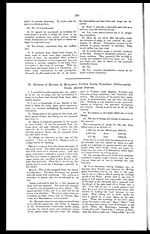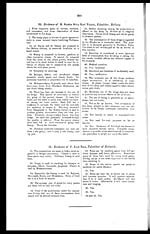Medicine - Drugs > Report of the Indian Hemp Drugs Commission, 1894-1895 > Volume VI > Evidence of Madras witnesses
(257) Page 239
Download files
Individual page:
Thumbnail gallery: Grid view | List view

239
God) and makes some obeisance. The Musalmans
place the earthen bowl on the hukka and then
smoke.
33. The consumption of ganja is generally
regarded contemptuously. Both social and reli-
gious opinion is against its practice. Among the
Musalmans the use of ganja or the use of any
form of the narcotic is forbidden by religion; but
among the Hindus, though not forbidden by
religion, yet the consumers are treated by their
brethren with disregard. The reason why the use
of any form of narcotic is in disrepute is that the
consumers are generally a set of lazy people, quite
averse to work as long as they can help and talk
vain stories. I do not know of any custom pre-
valent among certain sects of the people regarding
the worshipping of the hemp plant.
39. Drinking or eating of any preparation of
the hemp plant in this part of the country is not
in practice, and so it is impossible to say whether
smoking is less injurious or not.
40. Ganja is largely prescribed on account of
its medicinal qualities by native doctors to cure
cough, asthma, rheumatism, and cold. Ganja is
not used in the treatment of cattle disease here.
41. The people addicted to smoking of ganja
say invariably that its moderate use is very bene-
ficial in its effects, namely, curing cough, asthma,
rheumatism, cold, and promoting digestion.
42. As the moderate use of ganja is beneficial
in its effects, I think its use will not cause any
harm to the consumer.
43. The moderate consumers are inoffensive to
their neighbours, and cause no disturbance of
any kind to them.
44. The immediate effects of the moderate use
of ganja are very refreshing and produce a little
mild intoxication. The consumer lies down quiet-
ly for one or two hours. The eyes become red.
It creates great appetite. There are no after-
effects. The want of subsequent gratification pro-
duces longing and uneasiness, his thoughts roam
about, he feels painful sensation in the limbs, no
inclination to eat, he does not seem inclined to
follow his ordinary pursuits till his want is grati-
fied.
45. The habitual moderate use of ganja does
not produce any noxious effects on the consumer,
either mental or moral; but it affects physically,
i.e., he gradually diminishes in weight. Even
stout people accustomed to ganja smoking become
by degrees in the course of a few years thinner
and thinner. I have seen many habitual consu-
mers. I did not observe any change either mental
or moral when compared with non-consumers.
49. I am informed by native doctors and others
that the use of bhang and majun and curry ex-
cites aphrodisiac; but, on the other hand, smok-
ing ganja diminishes in course of a few years the
manly powers, and hence it is largely and invaria-
bly used in this form by the religious mendicants,
and devotees both of Hindu and Muhammadan
community.
51. In this part of the country, as a rule, the
habitual consumers do not come within the cate-
gory of bad characters.
53. The excessive indulgence in any of these
drugs incites to unpremeditated crime. I know a
case in which it has led to temporary homicidal
frenzy. A certain man of goldsmith's caste, who
indulged himself excessively in drinking bhang,
squeezed the neck of his own son, about two or
three years old, and murdered him, saying that
the deity whom he worships directed him to sacri-
fice his own son. He was not at all sorry for the
loss of his beloved child as long as he was under
its effects; but subsequent to the removal of its
effects, he was very penitent, and begged that he
should be hanged.
54. The criminals do not use these drugs to
fortify themselves to commit premeditated crimes
as far as my knowledge goes.
55. The criminals, in order to further their de-
signs, induce their victims (generally children and
females) to partake of these drugs and stupefy
them. The use of bhang or majun, which are
palatable, produces complete stupefaction for a
short time. While the victims are in that state
the criminals remove the jewels, etc., from their
persons, and walk away quietly. Sometimes the
young women are seduced by their paramours to
leave their parents and husbands' houses, and
follow them.
Note by the Commission on the case
referred to in Question 53, appended
to MUNSHI S. MAHOMED UNWAR
SAHIB'S evidence.
On 12th December 1883 this man caused the
death of his son, a child of two years, under the
following circumstances. The man dabbled in
alchemy and tried to transmute the baser metals
into gold, or discover hidden treasure.
Three or four days before the murder, a certain
Pandaram (name unknown) came to his house.
Under his advice and example, Kuppia smoked
ganja, which he had not touched before. He
smoked for the last time before 8 A.M., on 12th
December. At 3 P.M. that day (according to his
own statement, which was accepted as true), "I
made the child to sit near the fire. After my
return I found the child absent. I caught the
child and brought it near the fire. I placed the
two palms on the fire and pressed them. The
child cried. It was a Kartika Nakshatram day.
It came to my mind that it would be better to
send the child to God." So he killed the child,
and was found lapping the blood that had fallen
from its mouth when strangled. There was no
evidence of insanity, except the prisoner's wife's.
She said that the prisoner was a little insane, and
was now and then queer in his manner. After
making special medical inquiry as to his state of
mind, the High Court passed the following final
judgment:—
"The medical evidence does not support,
though it is not inconsistent with, the theory that
the appellant was irresponsible for his actions at
the time the murder was committed by reason of
unsoundness of mind. We had placed the case
before the medical officer in the manner most
favourable to the appellant.
"The plea of unsoundness of mind to a degree
and under circumstances sufficient to relieve the
appellant from criminal responsibility is not es-
tablished. On the other hand, the evidence of
the Village Munsif and the neighbours suggests
that the appellant had, by smoking bhang, pro-
duced an irritable condition of mind in which a
trivial disobedience on the part of his child stimu-
lated him to an act of gross cruelty, and while he
was engaged in it, the recollection that the day
was 'Kartika Nakshatram' suggested the destruc-
tion of the child's life as a religious act. This
act was not that of a man who was, at the time,
in the full enjoyment of his mental faculties; but
the appellant is apparently responsible for their
suspension, and we must affirm the conviction.
We, however, commute the sentence to transport-
ation for life."
Set display mode to: Large image | Zoom image | Transcription
Images and transcriptions on this page, including medium image downloads, may be used under the Creative Commons Attribution 4.0 International Licence unless otherwise stated. ![]()
| India Papers > Medicine - Drugs > Report of the Indian Hemp Drugs Commission, 1894-1895 > Volume VI > Evidence of Madras witnesses > (257) Page 239 |
|---|
| Permanent URL | https://digital.nls.uk/74909769 |
|---|




